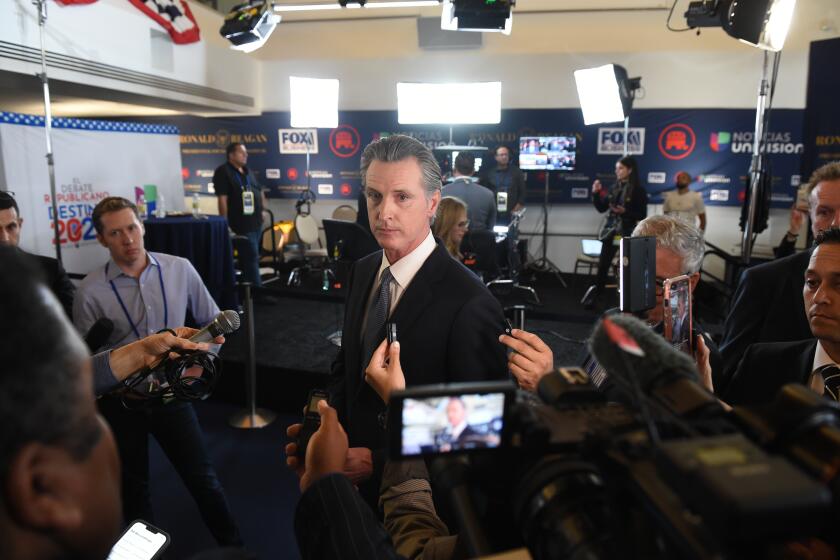BOOK REVIEW / NONFICTION : Beware the Mafia, the New Bogymen : THIEVES’ WORLD: The Threat of the New Global Network of Organized Crime <i> by Claire Sterling</i> ; Simon & Schuster $23, 304 pages
For a brief shining moment in recent history, when the Berlin Wall was tumbling and the Evil Empire was crumbling, some people actually wondered aloud what it would be like to live in a world without bad guys: What will John Le Carre and Tom Clancy write about now that they don’t have the KGB to kick around anymore?
No problem, Claire Sterling seems to say in “Thieves’ World”: We’ve got plenty of bogymen to worry about. Indeed, she raises the alarm about “a borderless criminal underground” that amounts to nothing less than “a worldwide emergency,” a vast conspiracy of crime that ranges from old-fashioned drug dealing and money laundering to more exotic scams such as trafficking in contraband caviar and stolen plutonium.
“Organized crime was transformed when the Soviet Empire crashed,” Sterling writes. “As the old geopolitical frontiers fell away, the big crime syndicates drew together, put an end to wars over turf, and declared a pax mafiosa .”
Sterling’s beat, so to speak, has been the threat of international terrorism, a threat that is still very much with us. But now she stakes out a new and even scarier turf--the all-pervasive, all-threatening world of organized crime.
“We have . . . to realize,” she writes, “that the Mafia and its confederates are the ultimate terrorists of our time.”
“Thieves’ World” is raw material for at least two or three Clancy or Le Carre novels. Sterling exposes what she regards as a spider’s web of criminal linkages between Russia and the criminal world--”the Colombian cartels, the Sicilian Mafia, the Chinese Triads, and the Japanese Yakuza,” all of which poured into Russia and Eastern Europe even as the red flag was being struck and a brave new world was opening up.
What’s truly new about the crime wave, Sterling insists, is the fact that the older criminal syndicates have joined forces with the so-called thieves’ world of Eastern Europe and Russia. According to Sterling, the term describes a cabal of criminal cohorts--”thieves within the code,” as they are known in Russian idiom--that dates back about three centuries. Only now Russian mobsters are armed with Kalashnikovs, they drive stolen Mercedeses and BMWs, and they’re peddling pocket-size nuclear weapons.
With drumbeat urgency, harum-scarum prose and lots of juicy quotes, Sterling evokes an international conspiracy that surpasses the old communist one that we used to fret about in the good old days. She names names, recounts horror stories of greed and violence, and reveals more dirty little secrets than we can count, all in a kind of savvy rap that comes from spending a lot of time with cops and their “informants.”
For example, Sterling declares the Caribbean island of Aruba to be “the world’s first independent mafia state.” She quotes a Drug Enforcement Administration agent on the failure of the much-touted war on the drug cartels of South America: “Colombia is gone .” And she explains that money laundering is now the biggest export industry of the Russian mafia: “The entire ex-Soviet bloc had become an enormous washing machine for dirty money.”
And if their criminal exploits were not daunting enough, Sterling insists that the Russian mafia and its allies are virtually invulnerable.
“For all the colossal wealth they are draining out of Russia and everywhere in the ex-Soviet commonwealth, these consummate criminals are never caught,” she writes. “Indeed, the more they take, the more they appear to be protected-- cosseted --at the highest government levels.”
At moments, there is a certain Chicken Little quality to Sterling’s book: “Nothing in history,” she writes in a characteristic moment of high anxiety, “compares to this cancer consuming the largest country in the world.” But the sheer accumulation of detail in “Thieves’ World,” the knowing quality of Sterling’s parade of horribles, begin to raise the familiar sense of paranoia that once tinged our perceptions of Russia.
“You people don’t know our mafia yet,” a Russian cop observes. “You will, you will.”
More to Read
Sign up for our Book Club newsletter
Get the latest news, events and more from the Los Angeles Times Book Club, and help us get L.A. reading and talking.
You may occasionally receive promotional content from the Los Angeles Times.




